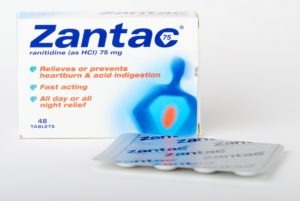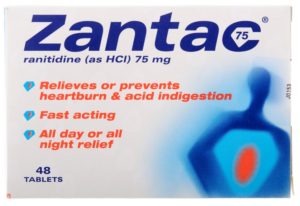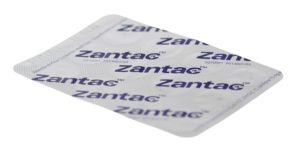What is Zantac?

Zantac and other ranitidine-based products belong to a class of drugs colloquially referred to as H2 (histamine-2) blockers. H2 blockers inhibit the cells in one’s stomach from being stimulated, thereby decreasing the amount of stomach acid produced. Because of this ability, Zantac is commonly used to treat the following conditions and symptoms:
- Heartburn
- Acid Reflux
- Stomach Ulcers
- Sour Stomach
- GERD (Gastroesophageal reflux disease)
- Zollinger-Ellison Syndrome
- Gastric and Duodenal Ulcers
- Barrett’s Esophagus
Zantac was originally approved by the FDA in 1983, and hit $1 billion in annual sales in just five years’ time. In the decades following, Zantac became arguably the most popular antacid medication on the market– due to its popularity and availability, it is estimated that as many as 15,000,000 Zantac/ ranitidine prescriptions were written per year. After Zantac’s original US patent expired in 1997, dozens of generic ranitidine drugs were introduced into the market.
The Risks Associated with Zantac
Ranitidine, the active ingredient in Zantac, is an unstable chemical, meaning that over time its compounds break down and degrade. The byproduct of this degradation is N-nitrosodimethylamine, or NDMA.
For a free legal consultation, call (725) 900-9000
NDMA is a chemical that the FDA and WHO have classified as a human carcinogen since the 1970s. It acts as a carcinogen by modifying the victim’s DNA and causing inflammation, resulting in tumor growth and promotion. Other drugs have had NDMA contamination due to production or storage errors, but in the case of Zantac, the ranitidine molecule itself contains the binding elements to form the carcinogen. In other words, it’s prepackaged and doesn’t need any outside factors to form. NDMA is found naturally, and because of that the FDA has established a daily intake limit of 96 nanograms (ng). However, recent studies of Zantac using FDA-approved methods have found more than 250 to 3,100 ng of NDMA in a single 150 mg tablet, the dosage innumerable people take every day. When stored under high temperatures, Zantac has been able to produce over 3,000,000 ng of NDMA per tablet. After decades of being available for public consumption, the FDA ordered manufacturers on April 1, 2020 to recall all Zantac and generic OTC ranitidine drugs from the market immediately. Litigation is currently ongoing.
Trusted Zantac Lawyers
If you or a loved one has a history of taking Zantac and has since been diagnosed with cancer, consult with a medical professional to address any immediate concerns. Then contact the experienced staff of Las Vegas Zantac attorneys at Van Law Firm.
Click to contact our personal injury lawyers today
Call our Las Vegas office at (725) 900-9000 Call Recording Disclaimer for a free consultation to discuss your potential case. Our personal injury and wrongful death lawyers can help recover multiple forms of damages such as medical costs, lost wages, and pain and suffering.
No obligation consultations are always free.
Let Us Help You! Call Now: (725) 900-9000


